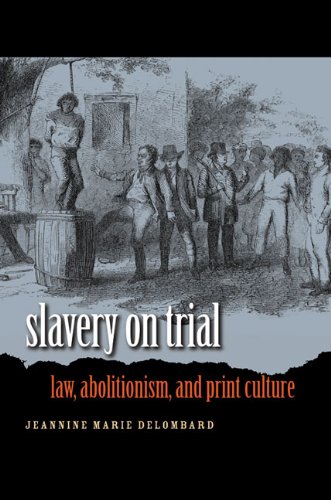

Most ebook files are in PDF format, so you can easily read them using various software such as Foxit Reader or directly on the Google Chrome browser.
Some ebook files are released by publishers in other formats such as .awz, .mobi, .epub, .fb2, etc. You may need to install specific software to read these formats on mobile/PC, such as Calibre.
Please read the tutorial at this link: https://ebookbell.com/faq
We offer FREE conversion to the popular formats you request; however, this may take some time. Therefore, right after payment, please email us, and we will try to provide the service as quickly as possible.
For some exceptional file formats or broken links (if any), please refrain from opening any disputes. Instead, email us first, and we will try to assist within a maximum of 6 hours.
EbookBell Team

0.0
0 reviews 
ISBN 10: 0807858129
ISBN 13: 978-0807858127
Author: Jeannine Marie Delombard
America's legal consciousness was high during the era that saw the imprisonment of abolitionist editor William Lloyd Garrison, the execution of slave revolutionary Nat Turner, and the hangings of John Brown and his Harpers Ferry co-conspirators. Jeannine Marie DeLombard examines how debates over slavery in the three decades before the Civil War employed legal language to "try" the case for slavery in the court of public opinion via popular print media. Discussing autobiographies by Frederick Douglass, a scandal narrative about Sojourner Truth, an abolitionist speech by Henry David Thoreau, sentimental fiction by Harriet Beecher Stowe, and a proslavery novel by William MacCreary Burwell, DeLombard argues that American literature of the era cannot be fully understood without an appreciation for the slavery debate in the courts and in print. Combining legal, literary, and book history approaches, Slavery on Trial provides a refreshing alternative to the official perspectives offered by the nation's founding documents, legal treatises, statutes, and judicial decisions. DeLombard invites us to view the intersection of slavery and law as so many antebellum Americans did--through the lens of popular print culture.
Part I: Banditti and Desperadoes, Incendiaries and Traitors
1. The Typographical Tribunal
2. Precarious Evidence: Sojourner Truth and the Matthias Scandal
Part II: At the Bar of Public Opinion
3. Eyewitness to the Cruelty: Frederick Douglass's 1845 Narrative
4. Talking Lawyerlike about Law: Black Advocacy and My Bondage and My Freedom
5. Representing the Slave: White Advocacy and Black Testimony in Harriet Beecher Stowe's Dred
6. The South's Countersuit: William Mac-Creary Burwell's White Acre vs. Black Acre
Conclusion
All Done Brown at Last: Illustrating Harpers Ferry
End Matter
Notes
Bibliography
Index
slavery on trial law abolitionism and print culture
slavery and the law
slavery in america and the world history culture and law
abolitionism and the pro-slavery response pdf
abolition laws
Tags: Jeannine Marie Delombard, Slavery, Trial, Law, Abolitionism, Print, Culture